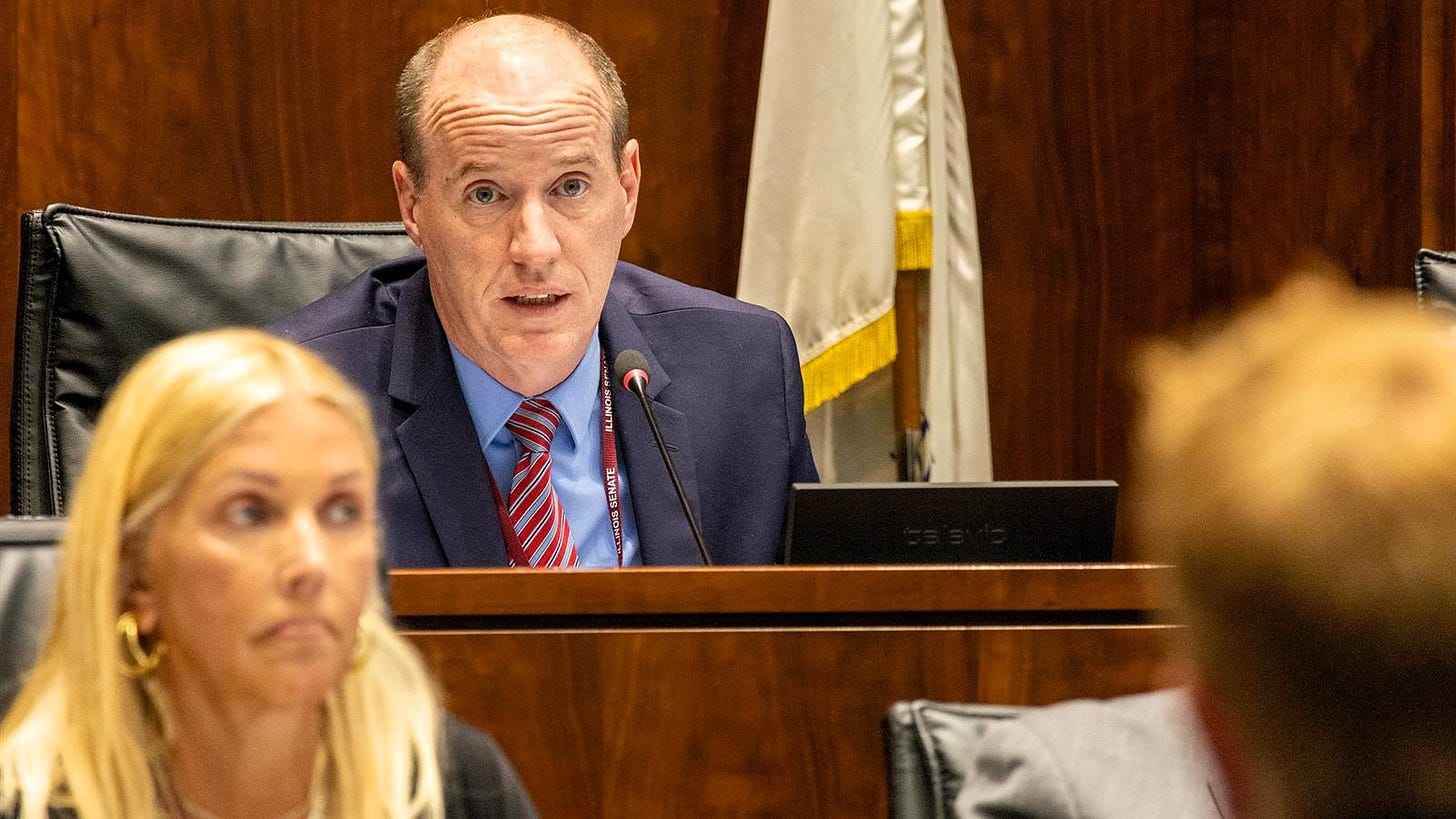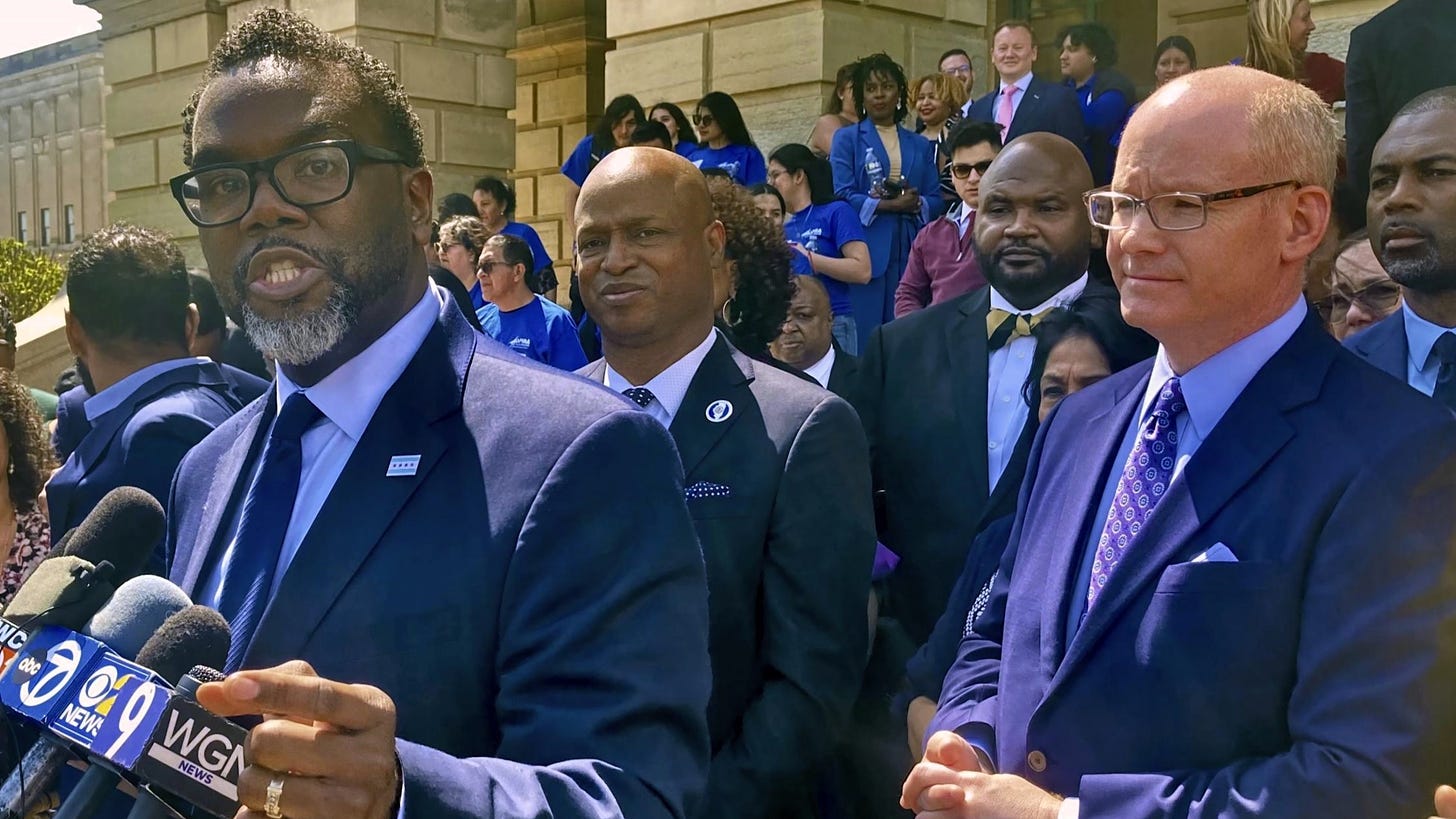THE ILLINOIZE: Monday Free for All...BIPA reform...Chicago School Board...Our goofy primary system
February 5, 2024
Good morning, Illinois.
Welcome to Super Bowl week, where the right will be talking about Taylor Swift stealing an election, the left will be talking about the right talking about Taylor Swift stealing and election and the rest of us want to talk about football. Fun.
I’m scheduled to fill in this Friday and a few days next week on the morning show on WMAY in Springfield. More on that for you Thursday.
There’s nothing on the Governor’s public schedule today. The House and Senate return at noon tomorrow.
Paid subscribers received four exclusive e-mail newsletters last week and were the first to get a bunch of news before anyone else.
You can join them for just $14.99 per month (or $149 per year!) Click below to join us.
Let’s get to it.
YOUR MONDAY FREE FOR ALL
(note: we’re not responsible for paywalls and restrictions from other news outlets, because good journalism isn’t free)
Democratic leaders poised to revisit Biometric Information Privacy Act after court rulings (Capitol News Illinois)
Nearly a year ago, the Illinois Supreme Court asked the General Assembly to clarify a 15-year-old law that’s led to hundreds of lawsuits and several high-dollar settlements with companies alleged to have illegally collected Illinoisans’ biometric data.
Now, Democratic leaders in the legislature appear ready to revive talks to reform the state’s Biometric Information Privacy Act, or BIPA, after business groups poured cold water on the majority party’s ideas last spring.
State Sen. Bill Cunningham, D-Chicago, a high-ranking member of the Senate, said the proposal he filed this week strikes a balance between business groups’ concerns over the law and its original intent.
“We think that the security restrictions embedded in (the law) are very important and we want to keep them in place, but we do want to address the way liability accrues so that businesses are not unfairly punished for technical violations of the act,” he said.
The law has made Illinois the only state that grants residents a private right to sue over businesses’ improper collection and mishandling of biometric data – whether they are an employee or a customer. A business can violate BIPA by not getting written consent from customers or employees for the data being collected, not having a storage policy in place or not properly protecting the data.
Cunningham’s Senate Bill 2979 would change BIPA’s violation accrual so that each initial collection of a fingerprint or other biometric data would amount to one violation, rather than a violation occurring for each individual scan. Employees might scan their fingerprints dozens of times per shift if they’re unlocking doors or cabinets with those scans.
The senator said that under his proposal, some “back-of-the-envelope math” indicates the change would dramatically reduce White Castle’s estimated $17 billion penalty down to anywhere between $10 million and $50 million.
“Some would call (the current understanding of violation accrual) annihilative liability,” Cunningham said. “It would essentially annihilate the business. It would cease to exist.”
Johnson tells state lawmakers he wants 10 school board members elected this year — not all 21 (Chicago Sun-Times)
Mayor Brandon Johnson has told the Illinois Senate president he would like to see 10 school board seats up for election this November, a decision that could help reignite stalled Springfield negotiations .
Some of the most critical details of the city’s first-ever school board elections remain up in the air just nine months from Election Day, including exactly how many board members voters will elect in the fall.
Johnson, who previously hadn’t publicly shared his view on the debate, said this week he would like to stick with the original legislation, which established a 21-member board with 10 elected this November and the mayor appointing the other 11, including the board president. Those 11 seats would then be up for election in November 2026.
In a letter to Illinois Senate President Don Harmon, D-Oak Park, dated Tuesday and obtained by the Chicago Sun-Times, Johnson said the 2021 school board legislation “clearly communicated to interested parties the timeline and structure of the initial elections, thereby informing their plans for participation.”
“Those agreements should be honored to allow for the intended phased transition to a fully elected school board,” Johnson wrote.
“I was personally involved in negotiating ... the bill you helped pass in 2021 that created a phased-in elected board,” the mayor said. “We engaged in multiple discussions specifically about that proposal at the end of the 2021 spring session. I remain proud of the work of all stakeholders who contributed to the process and my role in ushering in greater democracy to the Chicago Public Schools.”
“I appreciate the mayor’s clear direction on his preferred path forward, including his support for the strong ethics provisions contained in the Senate proposal,” Harmon said.
Illinois' partially-open primaries help political parties, discourage some from participating (Bloomington Pantagraph)
Under the letter of Illinois election law, any registered voter showing up to vote in a primary must state their "name, residence and party affiliation" to the precinct's election judges.
Next, one of those officials "shall thereupon announce the same in a distinct tone of voice, sufficiently loud to be heard by all persons in the polling place."
This language has been present in Illinois' election code since before women gained the franchise in 1920. Like many other antiquated laws, this dramatic reading no longer takes place in practice at modern-day polling places.
Nevertheless, the dated text highlights an aspect of Illinois' primary election process that has stood the test of time. Simply put, your vote is private, but your ballot is not.
This makes Illinois what's known as a "semi-open primary state."
The state's voters have the free choice to select a Democratic or Republican primary ballot and can even switch back and forth between the parties every two years without jumping through pesky hoops.
But that choice becomes part of the public record — available for anyone to examine by making a request from a county clerk's office or the Illinois State Board of Elections.
Proponents say Illinois' primaries have all the benefits of an open system while ensuring accountability through disclosure, which can deter members of the opposite party from engaging in mischief such as propping up a candidate viewed as easier to defeat in the general election.
John Opdycke, executive director of Open Primaries, a national advocacy group, acknowledges that "Illinois is not the worst," as it does not actually ban any voters from participating in primaries.
But, he said Illinois' system can have a de facto chilling effect of discouraging free participation, because many voters fear the real-life implications that may result from their primary voting record.
Related: In Illinois politics, remaps keep the powerful in power (Chicago Sun-Times)
TOP STORIES LAST WEEK ON THEILLINOIZE.COM
Bost Hauls In Cash While Bailey Fails to Get Outside Groups Involved
Niemerg, Challenger Fail to Qualify as Write Ins in All Counties
POLITICAL POTPOURRI
Copays take effect for immigrant health programs as cost estimates continue to decline (Capitol News Illinois)
Democrat, Republican lawmakers give support to bipartisan estate tax reform (State Journal-Register)
The Bears' real focus is the lakefront, not Arlington Heights (Crain’s Chicago Business)
Police chiefs, sheriffs weigh in on 'nonsensical' bill that came and went in a matter of hours (Champaign News-Gazette)
Pritzker dismisses significance of city's cease-fire resolution (Crain’s Chicago Business)
Trump’s attorneys hope to put Illinois ballot challenge on hold as U.S. Supreme Court arguments loom (Chicago Sun-Times)
Southwest suburban residents charged with entering U.S. Capitol on Jan. 6 (Chicago Sun-Times)
3 Democrats make case for Lance Yednock’s seat in 76th House District (Shaw Media)
'Meet voters where they are', UIS grad running for GOP primary nod (State Journal-Register)
Eileen O’Neill Burke would lose $211,000 yearly pension if elected Cook County state’s attorney. (Chicago Sun-Times)
Illinois incumbents in Congress have fundraising advantage over rivals heading into March primary (Chicago Sun-Times)
Editorial: ‘Rules for thee but not for me’? Cook County government hypocrisy becomes all too clear around paid leave. (Chicago Tribune)
Editorial: School funding progress needs to continue in Illinois (Quad-City Times)
Krishnamoorthi: Donald Trump’s latest racist attack deserves more than Nikki Haley’s weak response (Chicago Tribune)
Opinion: Chicago’s best bet might be keeping White Sox at Guaranteed Rate (Chicago Sun-Times)
JOIN US












